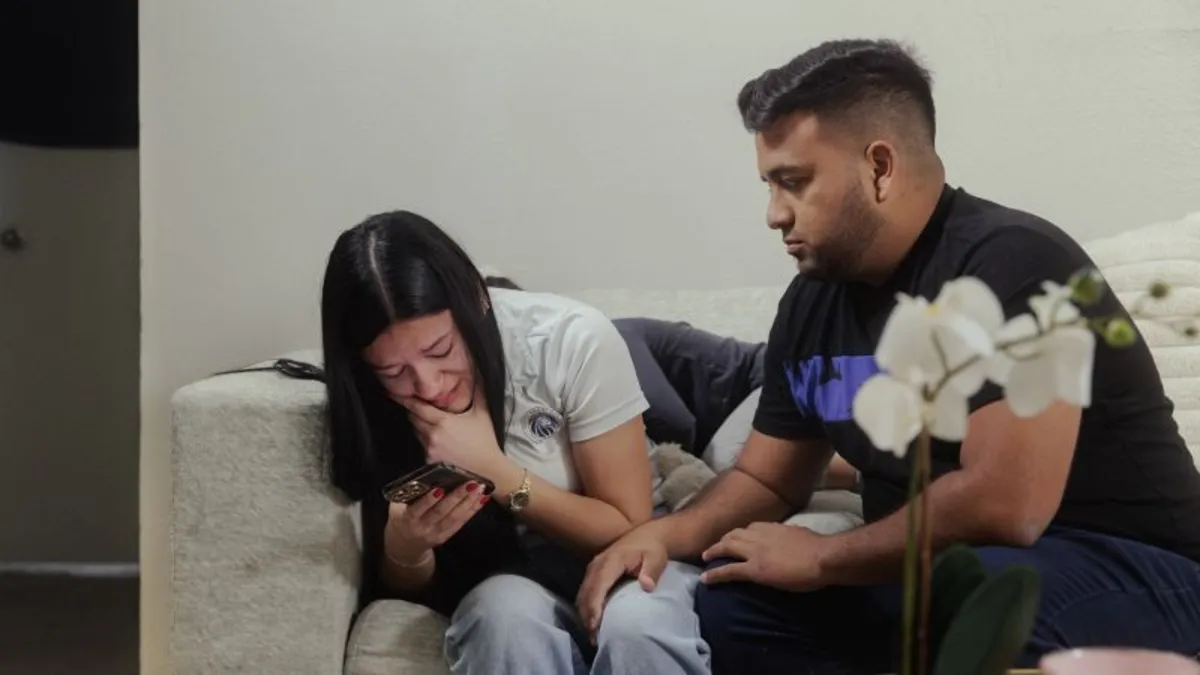
Yurliana Andreina Chacin Gómez held her cellphone tightly, her three-year-old daughter clinging to her as she listened to a federal official on the other end of the line. “He’s been removed,” the official confirmed, revealing the fate of her brother, Jhon Willian Chacin Gómez, a Venezuelan national who had been in U.S. custody. Overwhelmed with emotion, Yurliana collapsed onto the couch as she learned that her brother had been sent to El Salvador. For four agonizing days, she had searched for him after recognizing him in a handout video from the El Salvadoran government, which had identified him among those deported from the United States due to alleged ties to the Venezuelan gang Tren de Aragua. “He’s not a criminal,” she cried in Spanish, voicing her desperation and heartbreak.
Chacin Gómez’s experience is not an isolated case; it mirrors the stories of many families and immigration attorneys who have voiced their concerns to CNN. Numerous Venezuelan migrants have been detained in the U.S. and suddenly vanished from federal records, leaving their families and legal representatives scrambling to locate them. CNN reached out to the Department of Homeland Security (DHS) for clarification on the individuals moved to El Salvador and requested comments from Immigration and Customs Enforcement (ICE) regarding Chacin Gómez's brother and other deportees. The deportations stem from former President Donald Trump’s use of the Alien Enemies Act, a wartime authority that facilitated the rapid removal of suspected members of the Tren de Aragua gang to El Salvador.
The Trump administration has asserted that 137 immigrants were deported under this act, claiming they had connections to Tren de Aragua. However, despite the serious allegations, the administration has not provided specific evidence for each case, and CNN has been unable to confirm any affiliations with the gang. “I’ve been representing people in immigration court for 15 years, and this is the most shocking thing I’ve ever seen happen to one of our clients,” said Lindsay Toczylowski, co-founder and president of the Immigrant Defenders Law Center. She represents another Venezuelan asylum seeker who was abruptly deported to El Salvador. The Alien Enemies Act, a rarely used law from the 18th century, has only been invoked three times in U.S. history, all during significant military conflicts.
Once in El Salvador, the legal status and recourse of these migrants remain uncertain as they find themselves neither in U.S. custody nor back in their home country. U.S. officials have stated that the future of these deportees will depend on Salvadoran President Nayib Bukele, who has indicated that they will remain in the Center for Terrorism Confinement, or Cecot, for a year. This facility is notorious for its severe conditions. The Salvadoran government has insisted that it respects the human rights of all individuals in custody, regardless of nationality, and asserts that its prison system adheres to safety standards.
Trump has frequently cited Tren de Aragua, a gang that originated as a prison group in Venezuela and has been linked to human smuggling and other illicit activities targeting vulnerable migrants. The full extent of the gang’s operations remains unclear. Importantly, the Trump administration has acknowledged in court documents that many deportees it accuses of being affiliated with Tren de Aragua do not have criminal records in the U.S. Recently, Tren de Aragua was designated as a foreign terrorist organization, which has allowed for more stringent legal actions against its members in the United States.
Jhon Willian Chacin Gómez, a tattoo artist from Venezuela, crossed into the United States with his sister, Yurliana, last year. While Yurliana was permitted to stay in the U.S. with her daughter to pursue asylum, Jhon Willian was sent back to Mexico. After requesting an appointment through the CBP One app to legally enter the U.S., he was detained upon arrival at the California-Mexico border. Despite his attempts to find a legal pathway to remain in the U.S., he faced repeated denials. The siblings maintained a close relationship through daily phone and video calls, with Jhon Willian expressing his determination to reunite with Yurliana.
In early March, Jhon Willian was transferred to Texas without any explanation. His anxiety grew as he awaited news of his deportation. In their last conversation, he shared that there were movements at his facility, suggesting his imminent removal. Following his disappearance from the ICE locator system and communication apps, Yurliana felt a growing suspicion of his fate. Days later, she recognized him in a video of migrants arriving in El Salvador, leading her to fear for his well-being as she struggled to find a way to contact him.
Another notable case involves Arturo Suarez Trejo, an aspiring Venezuelan singer known as SuarezVzla. After living in Chile and attempting to advance his music career in the U.S., he was detained alongside his manager during the filming of a music video in North Carolina. His brother, Nelson, reported that Arturo had no criminal history and was in the process of applying for political asylum. However, after a brief detention in Georgia, he too was unexpectedly deported to El Salvador, leading to confusion and distress for his family, who were only made aware of his situation through government posts.
Many detainees were moved to Texas days before their deportation flights, leaving relatives and attorneys scrambling to locate them. Toczylowski’s client, who had entered the U.S. through the CBP One app, was scheduled for an immigration hearing but was missing when the time came. The absence of information led to a frantic search for his whereabouts, culminating in the confirmation of his deportation to El Salvador, despite ongoing asylum proceedings in the U.S.
The abrupt deportation of Venezuelan migrants to El Salvador raises significant concerns for their safety and legal rights. As families continue to seek answers, the implications of these removals highlight the urgent need for transparency and accountability in immigration practices. The situation serves as a reminder of the complexities and human costs involved in immigration policies, particularly for vulnerable populations seeking refuge and safety.